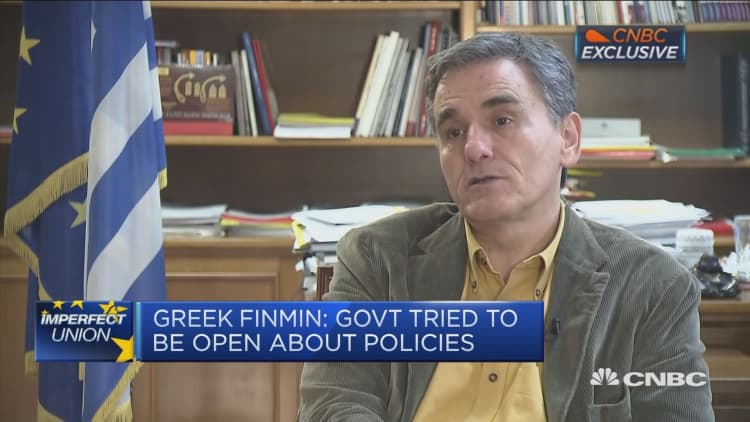
Greek Finance Minister Euclid Tsakalotos raised doubts about claims from rivals that corporate tax could be lowered to tempt more international firms to the country.
Ahead of an election later this year, the campaigning has already begun with the country's embattled economy still a major focus.
Greece's opposition party, the conservative New Democracy, told CNBC Tuesday that it wants to cut corporate tax from 28 percent this year to 20 percent in two years, if it wins the election.
In response to the proposal, Tsakalotos, a member of the ruling Syriza party, said he is unsure how the opposition could deliver that.
"Going to 20 percent would cost 1 billion (euros) ($1.1 billion). So, I would look with interest where that money is coming from," he said.
Tsakalotos argued the government should take a "balanced approach" when reducing corporate tax. He put forward a measure last year that aims to bring down tax by 1 percentage point event year to hit 25 percent in 2022.

Aggressive fiscal targets
There is, however, one measure where both the ruling Syriza party and the opposition are in agreement: Greece's fiscal targets are way too demanding.
Greece committed to its creditors to deliver a primary budget surplus (this is when a government has higher revenues compared to its spending) of 3.5 percent until 2022.
"I think there should be consensus across the political divide on this issue. I think the 3.5 percent — and I've said it for an awful long time — is too high, especially for a country that lost 27 percent of its GDP (gross domestic product). I don't think this should be something that we should disagree about. We should go together and say, you know, in a Europe that has taken the lesson from the rise of the radical right and populist forces — that such high primary surplus targets only feeds into discontent not only with the political parties but with the political process itself," he told CNBC.
"I have no disagreement with the leader of the opposition that we need to do this and it would be nice if he had (less of a conflicting attitude) so that we actually could have consensus on this issue," Tsakalotos added.


